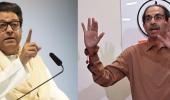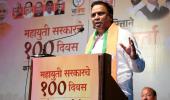'Like me there are crores of Marathi people in the state hoping for this miracle to work.'

Despite a strong undercurrent among party workers and sympathisers of both the Shiv Sena (Uddhav Balasaheb Thackeray) and the Maharashtra Navnirman Sena for a united Marathi voice in Mumbai's civic politics and ditto for other urban centres in the state, leaders in both camps remain tentative and evasive.
At the centre of the impasse is the elusive question: Will Uddhav Thackeray and Raj Thackeray, synonymous with the politics of aggressive Marathi pride -- the sentiment with which the late Bal Thackeray founded Shiv Sena in Mumbai six years after its formation on May 1, 1960 -- come together in time to disrupt the Bharatiya Janata Party's dream of capturing the Brihanmumbai Municipal Corporation (BMC)?
Raj Thackeray, who quit the Shiv Sena in November 2005 over leadership issues with cousin Uddhav Thackeray -- Raj's father the late Shrikant Thackeray and Uddhav's father the late Bal Thackeray were brothers; their mothers are sisters -- and formed the Maharashtra Navnirman Sena in March 2006, has since been unable to establish a firm footing in Maharashtra despite the party winning 13 MLAs in its maiden electoral contest in 2009.
With the BJP on the electoral upswing in the state since 2014 -- when Devendra Fadnavis became the BJP's first chief minister in Maharashtra -- and planning with all its might to wrest control of many municipal corporations from the SS (UBT) and other political rivals, Maharashtra is once again buzzing with the possibility of a 'Marathi Manoos Miracle' that could play a significant role in bringing the estranged cousins on a united political platform to puncture the BJP's dream run in the state.
But with municipal corporation elections just months away, the Thackeray cousins, party insiders and leaders say, are going one step forward and two steps backward.
'We are positive, but there is no proposal'
MNS leader Sandeep Deshpande reflects the guarded tone adopted by his party. "I will tell you we have not yet received any concrete proposal from the Shiv Sena UBT, and unless and until we receive it, we cannot comment on it," he tells Rediff.
Explaining why earlier attempts for a rapprochement bore no fruit, Deshpande says, "In 2014 we had given them a proposal to fight the assembly elections together and in 2017 to fight the BMC election... We had talks with (senior Shiv Sena [UBT] leader) Subhash Desai... But after getting the proposal, they were very positive. But at the last moment, they did not turn up. They did not pick up our phone call."
That sense of deja vu is strong. "They [SS (UBT)] have taken some steps. They have to decide what proposal they can give; how can you tell them about that?" Deshpande says cryptically. "Unless and until we get the proposal, we can't tell the benefits or drawbacks. Right now, there is no proposal," he says emphatically.
'It would make people like me happy'

Kirtikumar Shinde, former MNS leader who now represents Shiv Sena (UBT), is more vocal about the need for unity. "I left the MNS when Raj Thackeray supported Narendra Modi during the 2024 Lok Sabha elections. If the Sena and MNS are now coming together, then people like me, that would make them happy," he says.
Shinde, who maintains friendships and contacts on both sides of the Thackeray divide, believes the demand for unity is not just top-down. "There's a buzz at the grassroots level that the brothers should come together. People wonder -- what happens if they don't?"
The logic is both emotional and electoral. "Even if the Shiv Sena (UBT)'s candidates defect or switch sides, UBT candidates still get 6,000 to 7,000 votes per ward. If the MNS supports them, their chances of winning increase significantly," notes an SS (UBT) leader, citing internal estimates.
"Like me there are crores of Marathi people in the state hoping for this miracle to work. Being an emotional Marathi Manoos I strongly hope the 'Marathi Manoos Miracle' works. Let's see if it actually works or not," Shinde says.
The BJP isn't worried -- yet
According to a BJP internal survey, a united Sena (UBT)-MNS front will not substantially derail its prospects in the BMC elections.
The BJP machinery appears unfazed. Yet, party insiders admit in private that the thin victory margins in many wards -- often as narrow as 2,000 to 3,000 votes -- mean that a tactical alliance could still upset the BJP's arithmetic.
"If the Shiv Sena (UBT) and MNS were to align, they could emerge as a potent force, especially in Marathi-dominated wards in places like Mumbai, Thane, Nashik, Kalyan, and other urban centres," admits a senior BJP leader in Mumbai.
In the last BMC election in 2017, in multiple wards the BJP defeated the Shiv Sena (UBT) by wafer-thin margins, and MNS candidates had polled 5,000-8,000 votes -- often without winning. The undivided Shiv Sena and BJP were tied in a neck-and-neck race, with the former winning 84 seats and BJP winning 82 seats.
A mid-level Shiv Sena (UBT) leader said, "In some wards, simple arithmetic shows that MNS votes were the deciding factor. Add those up, and the whole picture changes."
'Take initiative. Don't tweet'
Earlier on Thursday morning, MNS leader from Chhatrapati Sambhaji Nagar, Prakash Mahajan, added a spark to the slow-burn suspense by publicly inviting Uddhav's son Aaditya Thackeray to take the lead. "If Shiv Sena (UBT) is serious, then a prominent leader should take the initiative. I mentioned the name of Aaditya Thackeray in that context," he Mahajan tells Rediff.
When aksed if he is authorised by the party to speak on its behalf and if his sentiments echo that of MNS President Raj Thackeray, Mahajan says, "This is not my personal opinion. I am speaking as the spokesperson of the MNS... Yes, you can write that this is also Raj Thackeray's view."
Mahajan's statement, made in Marathwada -- far from Mumbai's political corridors -- seems to have caused ripples across both parties. A senior Shiv Sena (UBT) leader asks, "Why is someone from Sambhaji Nagar speaking on BMC strategy? It muddles the waters. Is Raj Thackeray even on board?" he wonders.
Indeed, such out-of-turn statements are a part of the problem. "Raj Thackeray has told his people not to speak on this issue. Even then, some people keep talking, creating unnecessary confusion," adds Shinde.
'The Marathi voice is being erased'
For Shinde and many others, this goes beyond seat-sharing. "The BJP's emergence as a strong player in Mumbai has led to the Marathi voice in Mumbai getting erased," he says. "If the two Thackerays come together, it could become a huge political force -- both politically and electorally."
Shinde points out how cultural institutions and even artists no longer speak in Marathi political idioms. "Even in theatre or art, there's no political commentary left... If the two Thackerays come together -- a 'big Thackeray' image can be formed."
Sanjay Raut's silent diplomacy?
Another SS (UBT) leader hints that backchannel efforts may be underway. "Raj Thackeray and Shiv Sena (UBT) Rajya Sabha MP Sanjay Raut also have a very good relationship -- that's known -- for years now," he says. "If he's saying something [referring to Sanjay Raut's morning press conferences], it must carry weight."
He recalls the Maha Vikas Aghadi days, when Raut played a key role in forging the Shiv Sena-Congress-NCP alliance. "So maybe -- I don't know -- but there is effort happening to bring them together."
But until a firm handshake materialises, both sides appear trapped in a repetitive loop of cautious optimism and vague signalling, leaving their Marathi-speaking supporters in the lurch with each passing day.
'In politics, one and one is eleven'
Ultimately, says Mahajan, the cost of indecision could be greater than any electoral gain. "In Marathwada and Sambhaji Nagar, there are ordinary workers of both Shiv Sena (UBT) and MNS. Can you tell what's going on in their minds? If both parties come together, what will happen? And if not, then what?"
He adds with a laugh, "It's like a manifesto at the junction."
As the municipal corporation elections near, karyakartas in both parties are growing restless. "Alliances don't happen just through discussions in the media," Mahajan warns. "Talking through the media isn't the right way."
And so, while workers chant unity, leaders continue their cautious waltz. The Marathi voter, squeezed between nostalgia and realpolitik, watches and waits.
"Only Donald Trump can unite the Thackeray brothers," quips a senior MNS leader with a chuckle, summing up the exasperation and confusion among grassroots party workers .
If something 'concrete' doesn't materialise on the ground, perhaps only Donald Trump can then pull off the miracle as the MNS office-bearer remarked.











